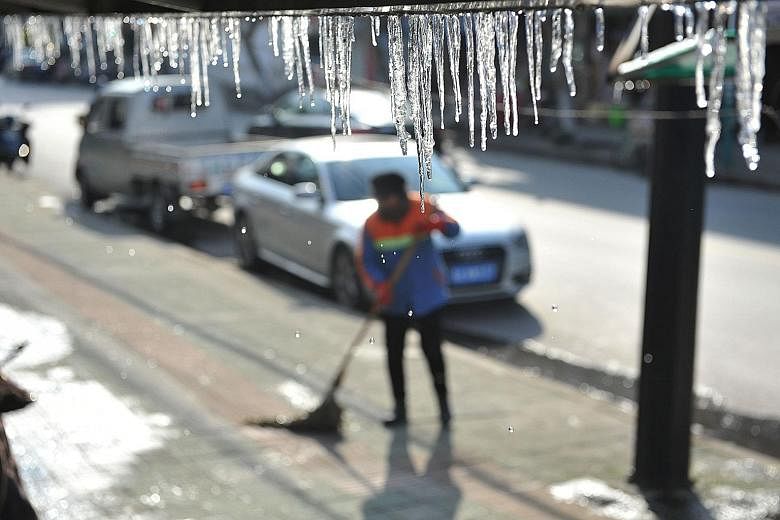BEIJING • A cold snap hit China yesterday, leading to an orange alert issued across the country by the National Meteorological Centre (NMC) amid forecasts of eye-watering lows of -41 deg C in some areas.
Orange is the second most severe cold weather warning on China's four-tier scale, with red for the most serious, followed by orange, yellow and blue. The NMC said temperatures would not peak above the freezing mark in most parts of the country, with the exception of a few spots in the south.
More than 100 flights were cancelled in Chongqing as snow blanketed the south-eastern metropolis for the first time in 20 years.
In the national capital Beijing, temperatures dropped to under -10 deg C last Friday and were expected to hit a 30-year low of -16 deg C this weekend, the NMC said.
Northern China braced itself for the worst, with the mercury predicted to plummet to -41 deg C in Genhe in Inner Mongolia. Neighbouring Mohe in Heilongjiang province is expecting -39 deg C temperatures.
Meanwhile, the Chinese authorities are struggling to restore electricity and ensure food and warmth as the worst cold front in years sweeps across most of the country.
In some mountainous areas, temperatures were at -29.8 deg C. The cold air moving south also brought low temperatures and rare snowfall to regions along the Yangtze river yesterday, according to the NMC.
Beijing District Heating Group said all 26 boilers in the company's three standby heat supply plants are in operation to meet the demand for heat. State Grid Beijing Electric Power is strengthening inspections to ensure electrical safety, and has arranged for more than 2,700 staff and 465 emergency vehicles to tackle possible blackouts.
Officials with the Beijing Municipal Commission of Commerce said they have increased the city's vegetable supply by 10 per cent in case roads are not passable to traffic. A large part of Jiangxi province was hit by snowstorms last Friday.
The eastern province's coldest weather since 1992 is expected to continue until Tuesday. Local power suppliers said part of the power grid in the cities of Nanchang and Jiujiang has been damaged by the extreme weather and 150,000 households have been affected.
Zhejiang province, hit by heavy snow since Friday, was expected to see temperatures drop to -11 deg C yesterday. The local civil affairs department has relocated some 13,000 people living in dilapidated houses or having problems keeping out the cold, and more than 40,000 quilts and 7,000 overcoats have been handed out to the vulnerable.
About 5,500ha of farmland in Zhejiang have been damaged, resulting in economic losses of about 40 million yuan (S$8.7 million), the civil affairs department said.
The eastern city of Shanghai, which neighbours Zhejiang, is expected to see temperatures drop to -6 or -7 deg C in the next 48 hours.
Even the tropical beaches on the southern island of Hainan were not spared, with temperatures clocking in at a cool 13 deg C, according to state-run CRI radio.
XINHUA, AGENCE FRANCE-PRESSE

